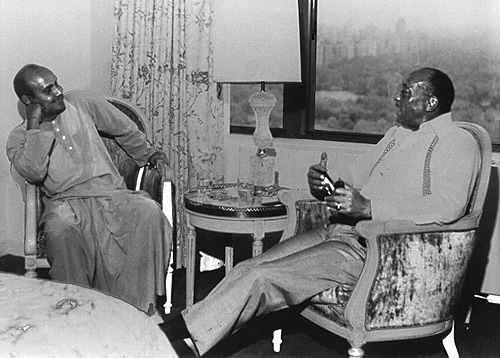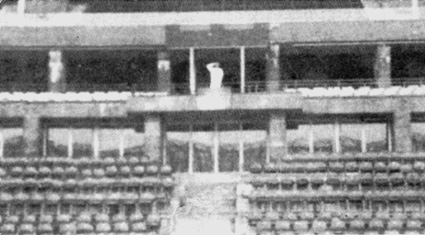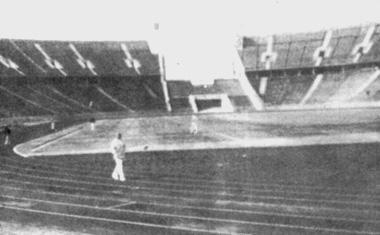
There is a certain indefinable feeling about visiting an Olympic stadium. Home to an entire era of sporting glories, it holds within its walls the essence of the athletic aspirations of its time, that words alone can never express.
The stands are now empty, the track is bare, there are no flags waving or cheers to be heard, yet the Olympic feeling lives on, in treasured memories of inspired deeds; in powerful images of men and women who ran like gods, who sacrificed all and won, taking humanity a little closer to the skies.
It is March 24th, 1985, Berlin stadium. Sri Chinmoy has come to honour the memory of the legendary Jesse Owens. At the entrance to the arena, he surveys, with gentle silence, the grand dimensions of the grounds.
The stadium was built for the 1936 Olympics. It was a showpiece for the Nazi regime, a spectacular complex capable of seating 110,000 people. The grandeur of the display was intimidating in its blatant anticipation of an Aryan victory.
As Sri Chinmoy begins to slowly circle the 400-metre track, he is still quietly absorbed.
One day in 1936 the world saw a humble young American black man crush the theories of Hitler's Aryan supremacy. Consistently, and often under protest from the German Game's officials, Jesse Owens beat the world's best athletes to win an unprecedented four Olympic gold medals. He became not only the hero of America but of every country that cherished freedom.

For an aspiring young sprinter in a small East Bengali village, just the name of Jesse Owens created a wondrous awe. In 1936, Sri Chinmoy was only 5 years of age but in his formative years as his interest in running developed, Jesse Owens became his athletic idol.
Down the straight Sri Chinmoy now walks, Jesse broke to the lead of the 100-metre final. In a relentless burst to the finish line, he was clocked at 10.3 seconds, breaking both the Olympic and the World records.
To the left, the running broad jump (long jump) pit. The sand, undisturbed, lies in waiting for the footprints of Jesse Owens to record another Olympic record. Sri Chinmoy seems to take his time, reflecting on the drama of that particular event.
The German officials had fouled Jesse's first two jumps and the crowds were restlessly awaiting Jesse's third attempt. It seemed the officials were ready to disqualify him wherever he placed his feet. Then a German competitor, Luz Long, someone who should have welcomed the thought of Jesse's disqualification, risking not only his athletic career but also his life, walked over and placed his towel one foot before the starting line of the jump. He told Jesse to place his foot on the towel when he jumped. His footprint on the towel would be the evidence that he did not foul. Jesse agreed and even though he had to step off one foot behind the board, his jump recorded a distance of 26 feet 5½ inches, the first time anyone had broken 26 feet in the history of the Olympics. The crowd was ecstatic. Hitler left the stadium in disgust.
Jesse Owens later said, "It took a lot of courage for him to befriend me in front of Hitler. You can melt down all the medals and cups I have and they wouldn't be a plating on the 24-karat friendship I felt for Luz Long at that moment. Hitler must have gone crazy watching us embrace."
Over 5,000 athletes from 52 countries competed in the 1936 Olympics, but none shone as brightly as Jesse Owens. The records he broke represented the efforts of the finest athletes the world had ever produced.
After the Olympics, Jesse Owens travelled and gave talks at various institutions. He was determined to help his brothers, white and black. He was a man of peace and he spread his message with anyone who would listen.

Sri Chinmoy was never able to meet Jesse Owens when he came to India in 1955, but he recalls with special fondness their meeting on November 2, 1972, in New York. At that time, Jesse Owens was 59 years old, but still lacked nothing of his urge to serve humanity. He saw in Sri Chinmoy, a kindred spirit – someone who understood the importance of striving to make the world a better place. "I believe very much in what you are doing. I am an admirer of yours," he told Sri Chinmoy, "I will preach my belief in your philosophy. You are inspiring people, motivating them to the bigger, better side of life."


Jesse Owens had a vision of a world at peace, a world where every person had the opportunity to reach their highest potential. He was a man of courage who was willing to challenge the blind ignorance of Hitler's ideology and the prejudice of even his own countrymen.
From the athletic oval looking high into the stands, the central point of focus is the box from where the Führer observed the Games. Hitler never acknowledged Jesse Owens' victories in those turbulent days of 1936.
Today Sri Chinmoy looks out over the historic site from the same viewing box. His face is charged with an expression of gratitude and admiration. He lifts his arm slowly and offers his soulful salute to the immortal Jesse Owens. It is a tribute that has waited 50 years – a tribute to a great champion of peace.
– End –
Notes:
This article was first published in Runners: Oneness-World Harbingers magazine, pages 18-19, Jul-Aug 1985.
Associated articles: The Immortal Jesse Owens and Travelling the Inner Road
Copyright © 2009, Animesh Harrington. All rights reserved under Creative Commons license.
